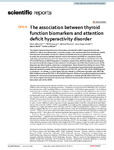2020-10-26Zeitschriftenartikel
The association between thyroid function biomarkers and attention deficit hyperactivity disorder
Albrecht, Diana
Ittermann, Till
Thamm, Michael
Grabe, Hans-Jörgen
Bahls, Martin
Völzke, Henry
The relation between thyroid function biomarkers and attention deficit hyperactivity disorder (ADHD) in children and adolescents is currently unclear. Cross-sectional data from the German Health Interview and Examination Survey for Children and Adolescents (KiGGS Baseline) was analyzed to assess the association between thyroid function biomarkers and ADHD in a population-based, nationally representative sample. The study cohort included 11,588 children and adolescents with 572 and 559 having an ADHD diagnosis or symptoms, respectively. ADHD symptoms were assessed through the Inattention/Hyperactivity subscale of the Strength and Difficulties Questionnaire. ADHD diagnosis was determined by a physician or psychologist. Serum thyroid stimulating hormone (TSH), free triiodothyronine (fT3), and free thyroxine (fT4) concentrations were determined enzymatically. Adjusted regression models were used to relate serum TSH, fT3, and fT4 with risk for ADHD diagnosis or symptoms. In children, a 1 mIU/l higher TSH was related to a 10% lower risk (odds ratio [OR] 0.90; 95% confidence interval [CI] 0.81–1.00) of ADHD diagnosis. We found a significant positive association between fT3 and continuously assessed ADHD symptoms in children (β 0.08; 95% CI 0.03–0.14). Our results suggest that physical maturity may influence the association between thyroid function biomarkers and risk for ADHD.
Files in this item

